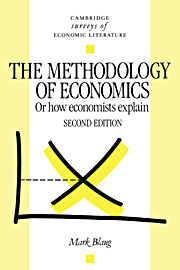Book contents
- Frontmatter
- Contents
- Preface
- Preface to first edition
- Part I What you always wanted to know about the philosophy of science but were afraid to ask
- 1 From the received view to the views of Popper
- 2 From Popper to the new heterodoxy
- Part II The history of economic methodology
- Part III A methodological appraisal of the neoclassical research program
- Part IV What have we now learned about economics?
- Glossary
- Suggestions for further reading
- Bibliography
- Name index
- Subject index
1 - From the received view to the views of Popper
Published online by Cambridge University Press: 10 December 2009
- Frontmatter
- Contents
- Preface
- Preface to first edition
- Part I What you always wanted to know about the philosophy of science but were afraid to ask
- 1 From the received view to the views of Popper
- 2 From Popper to the new heterodoxy
- Part II The history of economic methodology
- Part III A methodological appraisal of the neoclassical research program
- Part IV What have we now learned about economics?
- Glossary
- Suggestions for further reading
- Bibliography
- Name index
- Subject index
Summary
The received view
Anyone consulting some current textbooks in the philosophy of science will soon discover that the philosophy of science is a very strange subject: it is not, as might be expected, a study of the psychological and sociological factors that promote and encourage the discovery of scientific hypotheses; it is not an examination of the philosophical views of the world that are implicit in leading scientific theories; it is not even a reflection on the principles, methods, and results of the physical and social sciences, describing at the highest level of generality the pinnacles of scientific achievement. Instead, it appears to consist largely of a purely logical analysis of the formal structure of scientific theories, which seem to be more concerned with prescribing good scientific practice than with describing what it is that has actually passed as science; and when it mentions the history of science at all, it is written as if classical physics were the prototype science to which all other disciplines must sooner or later conform if they are to justify the title of “science.”
This characterization of the philosophy of science is now somewhat out of date, reflecting as it does the heyday of logical positivism in the interwar years. Between the 1920s and 1950s, philosophers of science did more or less agree with what Frederick Suppe (1974) has called “The Received View on Theories.”
- Type
- Chapter
- Information
- The Methodology of EconomicsOr, How Economists Explain, pp. 3 - 26Publisher: Cambridge University PressPrint publication year: 1992

